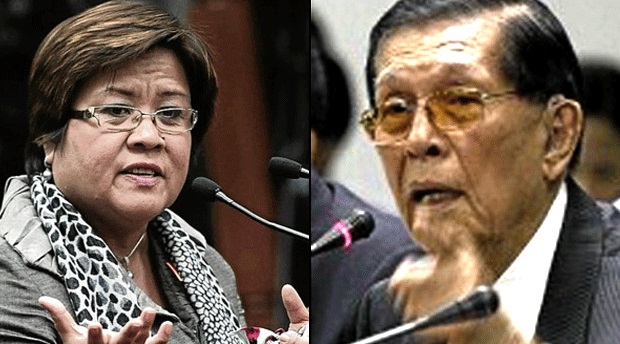‘Back to banana republic’
For bending court rules and even bail provisions under the Constitution, the Supreme Court decision to release Sen. Juan Ponce Enrile while on trial for the no-bail offense of plunder has set the state of the Philippine justice system back to that of a “banana republic,” Justice Secretary Leila de Lima said on Friday.
READ: 4 SC justices hit Enrile bail
The Macmillan English Dictionary defines “banana republic” as an insulting term for a tropical country with a weak economy, a dishonest or cruel government and public services that do not work.
De Lima said the majority decision “gives the impression that the court is capable of being partial to the so-called elite, and that its decisions can be grounded not on what the law is, but on who the party is.”
Supreme Court spokesperson Theodore Te declined to comment on De Lima’s statement.
Article continues after this advertisementEnrile left the Philippine National Police General Hospital on Thursday night after the Supreme Court issued the release order, enforcing a ruling that granted the senator’s bail petition on humanitarian grounds.
Article continues after this advertisementEnrile posted bail for P1.4-million at the Sandiganbayan and was released.
Enrile won temporary liberty through an 8-4 vote of the Supreme Court, with majority of the magistrates invoking humanitarian considerations in releasing the 91-year-old lawmaker.
Frail health?
Enrile said he planned to immediately go back to work in the Senate, although he invoked the poor state of his health in asking to be detained at the PNP General Hospital in July last year.
The Supreme Court ruling, written for the majority by Associate Justice Lucas Bersamin, cited Enrile’s frail health, his “solid reputation,” and decades of public service in granting him bail.
Associate Justice Marvic Leonen, in his dissenting vote supported by three other magistrates—Chief Justice Maria Lourdes Sereno and Associate Justices Antonio Carpio and Estela Perlas-Bernabe—called the decision a “special accommodation” that reeks of the court’s undue favor for one petitioner.
Leonen pointed out that Enrile did not even invoke humanitarian considerations in his bail petition, and that such a ground for granting an exemption from bail does not exist.
READ: Enrile bail a ‘special accommodation,’ says SC Justice
Enrile is on trial at the Sandiganbayan on charges that he, through his former chief of staff Gigi Reyes, pocketed P173 million in kickbacks from projects financed with his allocations from the Priority Development Assistance Fund (PDAF), a pork barrel that the Supreme Court struck down as unconstitutional in 2013.
Besides plunder, Enrile is also charged with 15 counts of graft brought by the Office of the Ombudsman.
Also on trial on plunder and graft charges over the P10-billion pork barrel scam allegedly orchestrated by businesswoman Janet Lim-Napoles are Senators Bong Revilla and Jinggoy Estrada.
Court rules
De Lima agreed with Leonen’s view, saying: “The decision is not in accord with settled jurisprudence, which interprets the constitutional and rules of court provisions on nonbailable offenses.”
Article 3, Section 13 of the 1987 Constitution set conditions for granting bail: “All persons, except those charged with offenses punishable by reclusion perpetua when evidence of guilt is strong, shall, before conviction, be bailable by sufficient sureties or be released on recognizance as may be provided by law.”
“The only exception to the rule on the denial of bail for those charged with capital offenses or offenses punishable with reclusion perpetua is if the evidence is not strong,” De Lima said.
She said the Supreme Court did not even rule on the strength of the prosecution’s evidence against Enrile.
In Leonen’s words, the decision “set an unstated if not ambiguous standard for the special grant of bail on the ground of medical conditions.”
“In Enrile’s case, the majority of the court did not even take up the evidence against Enrile, but based their decision on so-called humanitarian grounds. And the court did this for a powerful political person,” De Lima said.
